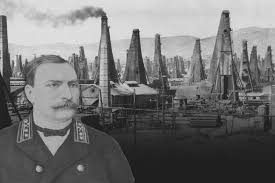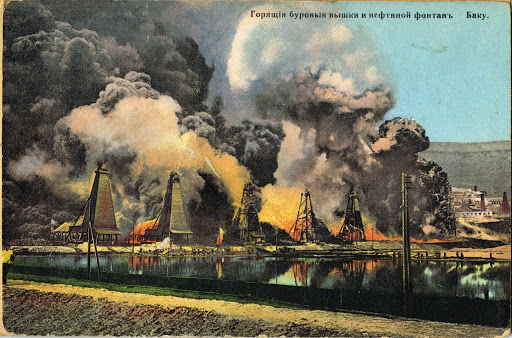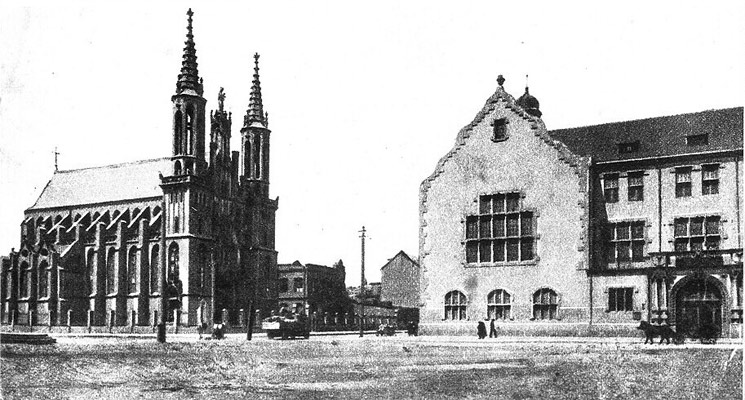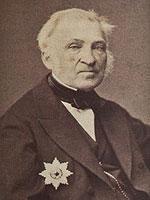Our Polish Roots – „Polish Nobel” – Witold Zglenicki

Author: Jarek Micewski
“It was HE who started the epoch of oil extraction in the submarine region. Without his invention – providing 1/3 of the total oil production of oil rigs – our civilization would not survive even a month „- assessed Andrzej and Irena Fedorowicz in the publication” 25 Inventions and Discoverers Who Changed the World.
This year marks the 170th anniversary of the birth of „POLSKI NOBEL” Witold Zglenicki – philanthropist, great patron of science and education, geologist engineer – legendary Polish patriot and genius explorer.
The surviving book of births of the Witonia parish shows that Witold Leon Julian Zglenicki was born in Mazovia on January 6, 1850 in the village of Wargawa Stara (now Łęczyca poviat) in a gentry (gentry) family. In the years 1859-66 he studied at the Provincial Gymnasium in Płock.
In the years 1866-70 he studied at the Faculty of Mathematics and Physics of the Warsaw School of Economics. And from 1870 to 1875 he was a student at the Mining Institute in St. Petersburg. It was a time of repression after the January Uprising; positivism, socialism and nationalism crystallized. Zglenicki was the closest to positivism, that is, working at the grassroots level, being guided by reason and not only by emotions. He graduated from the studies in St. Petersburg with the first place, and it must be remembered that at that time the Mining Institute in St. Petersburg presented the highest in the world – in its field – level of education. He caught the attention of Mendeleev, but he decided to devote himself to mining, not chemistry, seeing the oil industry as an important factor in industrial and scientific development. At that time, Poland was in captivity for 123 years and under the occupation of Russia, Germany and Austria.
In 1890, he was appointed to work in the Mining Authority – delegated to the Tax Office in Riga, where he worked for two years. He gained a very good opinion there. So he was offered a job as the chief engineer of the Donetsk Mine District. However, Zglenicki refused – which was not welcomed by the tsarist authorities – and, under the protection of Count Beckendorff, started working at the Bakin Assay Office, where he worked until the end of his life.

Baku on the Caspian Sea (now Azerbaijan), at that time, was the outskirts of Russia, a place of exile for wayward officers, a lair of rogues and derailed people. When Zglenicki came to Baku in 1891 to take a job, the city resembled a sunken Californian town that was becoming metropolises overnight during the „gold rush”.On the wave of the oil boom, their own shafts and refineries built their own shafts in Baku, among otherswealthy industrialists – like the brothers Alfred, Robert and Ludwig Nobel, or bankers – like the Rothschilds.Soon Rockeffeller will also start to be interested in Caspian oil.ATTENTION! Earlier, however, he sent his workers to Poland, to a province then called Galicia.He sends them to study at the pioneer of oil mining, the inventor of the oil lamp the brilliant Pole, Ignacy Łukasiewicz.

After the authorities allowed private individuals to buy oil plots in 1872, daily oil production in Azerbaijan increased from 60 tons to 32,000 tons. tons – eleven times more than then in the USA-. In 1873, there were only 9 shafts, and two years later – 251. Poles were one of the most numerous of the 30 ethnic groups living in Baku. There was no sewage system, no water supply, it was plagued by epidemics of diphtheria, typhus, and cholera. The water available was saline and contaminated with kerosene. For this reason, engineer Zglenicki initiates the construction of municipal waterworks, and thanks to his financial help, a Polish church is being built in the city center. For his professionalism, diligent work and discoveries that he made available for free, he was promoted to the rank of colonel, and the tsar granted him the rights to oil plots on land and in the Caspian Sea. Some of them are purchased from their own resources.
Unexpectedly at 51, he learns that he is terminally ill. Diabetes is then incurable. Thus, the engineer bequeathed most of his property to POLISH SCIENCE, and a part to the Russian one, as a token of gratitude for his education in St. Witold Zglenicki dies on July 6, 1904. The body was taken to the homeland and buried in the family grave in Wola Kiełpińska near Zegrze near Warsaw.
According to its provision, a Catholic church and a technical school are to be built in each governorate of the Kingdom of Poland, in which poor students will study for free from the income of the foundation.Support is also to be granted to scientific communities, research laboratories will be created and supported, and awards for outstanding scientific achievements will be funded.
All these works are to be carried out by the Foundation – Kasa im. Jozef Mianowski in Warsaw.

Foundation Jozef Mianowski was then the main Polish scientific institution, founded by professors and students of the Main School in Warsaw, which granted loans to scientists, Zglenicki wrote, inter alia, income from half of an oil plot in Surachany with the proviso that; ATTENTION! „she did not sell her rights to this income, but used it for eternity.” He also gave her the free amount that would remain after the execution of the provisions of the will, to make it an „endowment”, and from the interest she funded awards „for the best works on European literature, art and science, such as Nobel prizes”. Zglenicki – in his will – categorically prohibits the sale of property or rights to it, and orders it to be used by Polish science for all time.
The provisions of his will were implemented on the spot by an alleged friend of the engineer, who he tried to sell some of the plots of land, and lease some to the Caspian-Black Sea Society, belonging to the family of Parisian bankers ROTHSCHILD. According to the Zglenicki family, only 20% of the amounts due then went to the Mianowski. Nevertheless, the sums were so large that at some point they were beyond the capacity of the Fund to spend them. And this was just the beginning of the exploitation of kerosene deposits. The really big profits – as the engineer had predicted – were to start pouring in later.
For this reason, in 1910, under the influence of Polish public opinion, a lawsuit was brought to invalidate the lease agreements concluded with the Rothschilds. The Rylski company, a family of Polish industrialists operating in the Caucasus, expressed the desire to exploit the oil deposits from Zglenicki’s plots at that time. It offered much more favorable financial conditions than the Rothschilds. Perhaps there was not enough political will in Russia, or the Rothschilds had better lawyers, and the Zglenicki family – to the detriment of Polish science – did not win the trial. World War I broke out soon after, followed by the Bolshevik Revolution. All enterprises were nationalized and confiscated by the Bolsheviks.
After Poland won the war of 1920, the case of the record of Eng. Zglenicki was even discussed during the peace negotiations in Riga. However, it was revived in 1923. It was then that the Zglenicki family – at the invitation of the leader of the World Communist Revolution, Włodzimierz Ilyich Lenin – in 1923 as part of the so-called Novaj Ekonomiczekaj Palityki, travels to Baku and with his own and borrowed money, launches oil wells and oil rigs destroyed by the Turkish army and the revolution. While before the First World War and the Bolshevik Revolution, kerosene was flowing in a stream, now it is gushing out in a wide river. It was then that the communists once again, and this time finally, confiscate the oil fields, rebuilt shafts and platforms, and the Soviet Union has been pumping oil there for decades.
The deposits of kerosene discovered by a Pole stimulate the imagination of Hitler, who needs it very much to implement his plans to conquer the world. So he drops his armored divisions at Stalingrad. German tanks and alpine rifle divisions reach the Caucasus. The vast reserves of kerosene are almost at hand. Fortunately, young Polish scientists, even before World War II, break German codes, build a double of the Nazi Enigma cipher machine and contribute to the defeat of the Wehrmacht in Stalingrad and the victory of the Allies throughout the war.
In 1944 the Engineer’s family again applied to the Lublin communist government (PKWN) regarding his will, but to no avail, and the last representative of the foundation, prof. Polytechnics of Lviv and Gdańsk, Maksymilian Tytus Huber was forced by force to hand over the assets of Zglenicki, the Polish Academy of Sciences, which is currently being established. The efforts of the Zglenicki family, renewed in the 1980s and the petitions addressed to General Wojciech Jaruzelski, ALSO remained without a positive response.
One thing is worth emphasizing – although the property of Eng. Witold Zglenicki was smaller than the property of Alfred Nobel, so effectively science received more from his record than from the Nobel record. But what kind of money could it be?
After reading the documents, it is known that the ROTHSCHILD – an international family of German Jews, one of the richest families in the world – were required to donate to the market foundation the equivalent of 16% of the produced gas and 20% of kerosene. Taking this into account and the testimonies of the Zglenicki family and the engineer’s widow (who was financially secured by him and never made any claims to the assets enrolled for Polish science), as well as inflationary and deflationary changes in the value of the American currency (according to the calculator of the Federal Reserve Bank of Minneapolis ), The Caspian-Black Sea Society of the Rothschilds only in 1908? 1915, should donate the sum of $ 220 million today. Perhaps this amount would be higher if we additionally take into account the increase in kerosene prices in the past years. This may mean that during this period, oil worth at least USD 1,100,000,000 was extracted from the Zglenicki wells.
It is worth adding that the Nobel Foundation was established four years before Zglenicki’s death for the sum of approximately 160,000,000 USD (according to Sverige Bank).This comparison reflects the greatness of the POLISH Engineer and his foundation.Never has Polish science – including the foundation of the Krakow Academy by King Casimir the Great and its renewal by Queen Jadwiga – received such a generous record. And this should be measured by the patriotism and greatness of our compatriot, the genius and heart of the Engineer. Not because of His fault, but because of the Parisian bankers and the whirlwinds of history, the work of TO was destroyed, to the great detriment of Polish Science, Education and the Nation.
In recent years, the Foundation of Polish Science was established in Poland. Eng. Witold Zglenicki, It aims to remind the world, especially Poles, of the Engineer (for many years he was NOT allowed to be mentioned), his achievements in the field of the oil industry and his contribution to Polish science. The Foundation is a charitable institution, it deals with the acquisition and free transfer of modern laboratory equipment in the field of power electronics to Polish technical schools – secondary and higher education. The Foundation is also making efforts to return Zglenicki’s assets and pay the outstanding debts. Some hopes may be associated with the fact that the USSR is no longer there, Azerbaijan, whose capital is Baku, is an independent country and Western companies are regaining their property rights, which they had lost earlier.
###
Sad and unpleasant are the fate of the will of POLISH Ing. Zglenicki. However, let’s hope that not all is irretrievably lost. Perhaps things would have been different had it not been for geography, history and politics. Perhaps then Zglenicki would not be called the Polish Nobel Prize, but the Nobel Prize would be the Swedish Zglenicki.
###
Source: Bibliography: Historia commune Witonia (mainly) / Polish Radio / Andrzej Chodubski „Polish Nobel 1850-1904” 1984 / Marek Zawadzki: Polish Nobel Prize engineer Witold Zglenicki / Our Magazine – Our and Polish (bimonthly) for Naszepismo.pl developed by Jarek Micewski
&&&&&&&&&&&&&&&&&&&&&&&&&&&&&&&&&&&&&&&&&&&&&&&&&&&&&&&&&&&&&&&&
